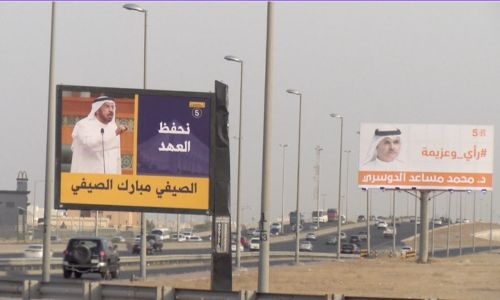Kuwaitis again called to vote amid political paralysis
AFP | Kuwait City
The Daily Tribune – www.newsofbahrain.com
Kuwait is staging its seventh general election in just over 10 years on Tuesday as the oil-rich Gulf state remains mired in a political impasse undermining hopes of economic reform.
Fearing that widespread scepticism will discourage many people from voting, the authorities have festooned the capital with posters in an attempt to encourage a better turnout.
The latest general election was called by the emir last month after he again dissolved parliament amid a persistent deadlock with the executive branch that has stalled reforms.
Kuwait adopted a parliamentary system in 1962, but repeated political crises over the past years have resulted in state paralysis.
The emirate suffers from constant stand-offs between elected lawmakers and cabinets installed by the reigning Al-Sabah family, which maintains a firm grip on political life.
"We have to wake up and face up to this great frustration," activist and university professor Sheikha al-Jassem told AFP of the political crisis.
One of the world's largest producers of crude oil, Kuwait is the only Gulf Arab state to have an elected parliament with powers to hold government to account.
On April 9, its seventh new government in three years was announced after the previous cabinet resigned in January only three months after taking office.
Just over a week later, the ruling family dissolved parliament and called a new general election.
The emir, 85-year-old Nawaf al-Ahmad Al-Sabah, has stepped back from political life in favour of the crown prince, 82-year-old Meshal al-Ahmad al-Jaber Al-Sabah.
- 'Incomplete' democracy -
MPs and civil society in Kuwait regularly take the authorities to task, but the Al-Sabahs keep a tight hold on ministerial portfolios, reserving key posts for the family.
In March, the constitutional court nullified the results of legislative elections held last year -- in which the opposition won the most seats -- and ruled that the previous parliament elected in 2020 be reinstated instead.
That parliament was then dissolved by the emir on April 17.
The opposition is taking part in Tuesday's vote in which 207 candidates, including 13 women, are standing, the lowest number of candidates in a legislative election since 1996.
Jassem has herself stood for election in the past, but will no longer do so under a current stalemate she attributes to the lack of voter lists and political parties being banned.
"Political life needs to be better organised," she said.
"Everyone acts too individually. Our commitment is superficial and our democracy incomplete."
Disputes between parliament and the executive branch often break out when MPs want to question ministers about allegations of corruption or poor management of the public purse.
Kuwaiti analyst Ayed al-Manaa told AFP the people have a "lack of confidence" in the political class.
"Kuwaitis are tired" by the situation, he said, adding that he feared the latest election would again result in a scenario in which the government resigns and parliament is dissolved.
The continuing political standoff in Kuwait, and resulting lack of stability, has scared off investors, dashing hopes of reform in a wealthy country struggling to diversify in similar ways to its Gulf neighbours.
Regional powerhouse Saudi Arabia, the United Arab Emirates and Qatar are all hydrocarbon-based economies that have diversified in recent years to attract more investment from abroad.
Related Posts

